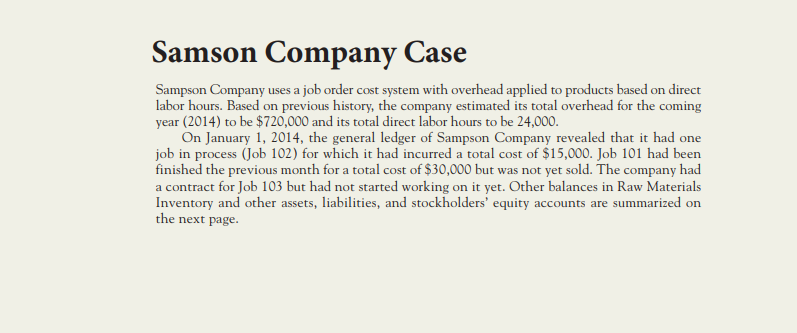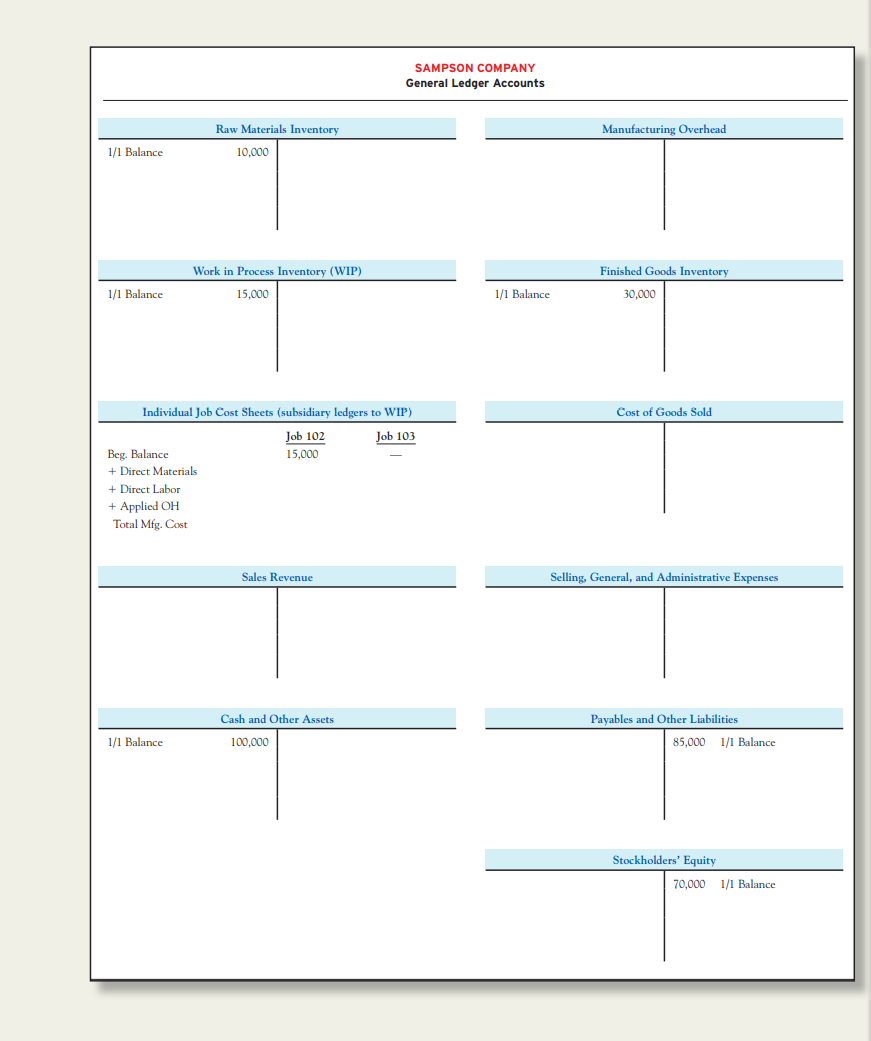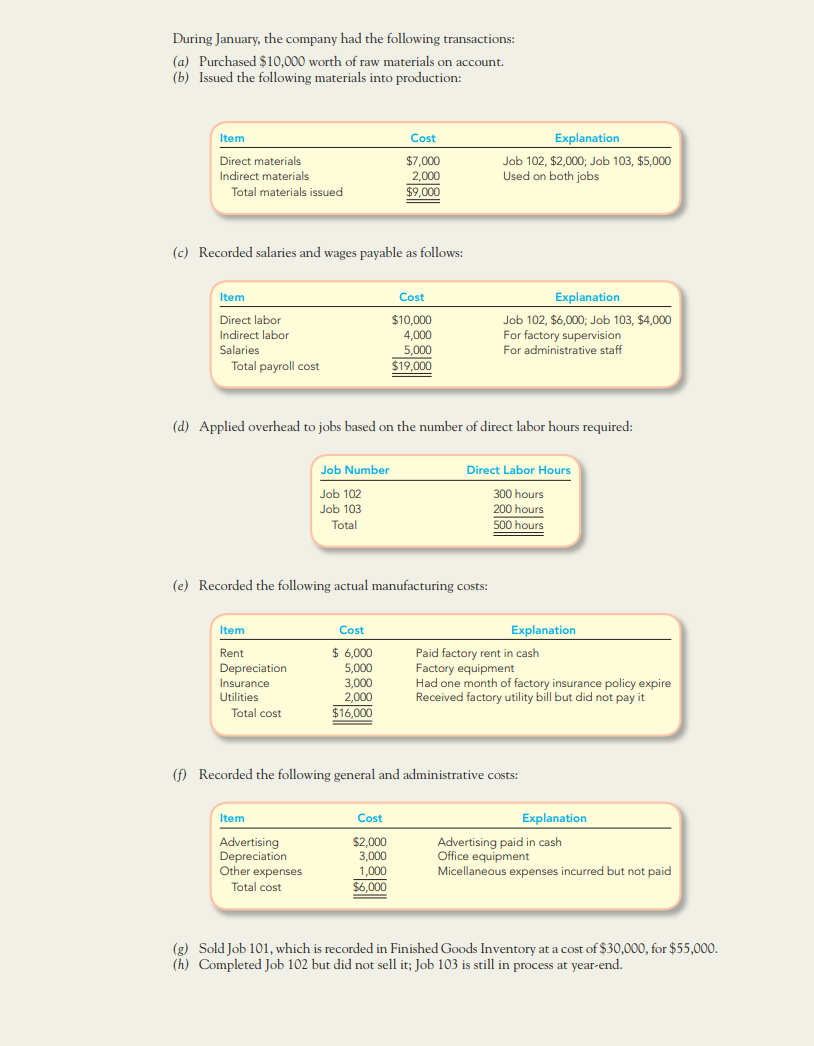Answered step by step
Verified Expert Solution
Question
1 Approved Answer
Hello, Please help solve question from 5-8. Thank You. 5. Calculate the amount of over- or underapplied overhead. 6. Prepare the journal entry to dispose



Hello, Please help solve question from 5-8. Thank You.
5. Calculate the amount of over- or underapplied overhead.
6. Prepare the journal entry to dispose of the overhead balance assuming that it had been a year-end balance instead of a month-end balance. Post the effect to the general ledger T-accounts.
7. Prepare a statement of cost of goods manufactured report including the adjustment for over or underapplied overhead.
8. Prepare a brief income statement for Sampson Company.
Samson Company Case Sampson Company uses a job order cost system with overhead applied to products based on direct labor hours. Based on previous history, the company estimated its total overhead for the coming year (2014) to be $720,000 and its total direct labor hours to be 24,000. On January 1, 2014, the general ledger of Sampson Company revealed that it had one job in process (Job 102) for which it had incurred a total cost of $15,000. Job 101 had been finished the previous month for a total cost of $30,000 but was not yet sold. The company had a contract for Job 103 but had not started working on it yet. Other balances in Raw Materials Inventory and other assets, liabilities, and stockholders' equity accounts are summarized on the next page. SAMPSON COMPANY General Ledger Accounts Raw Materials Inventory Manufacturing Overhead 1/1 Balance 10,000 Work in Process Inventory (WIP) Finished Goods Inventory 30,000 1/1 Balance 15,000 1/1 Balance Cost of Goods Sold Individual Job Cost Sheets (subsidiary ledgers to WIP) Job 102 Job 103 Beg. Balance 15,000 + Direct Materials + Direct Labor + Applied OH Total Mfg. Cost Sales Revenue Selling, General, and Administrative Expenses Payables and Other Liabilities Cash and Other Assets 100,000 1/1 Balance 85,000 1/1 Balance Stockholders' Equity 70,000 1/1 Balance During January, the company had the following transactions: (a) Purchased $10,000 worth of raw materials on account. (b) Issued the following materials into production: Cost Item Direct materials Indirect materials Total materials issued $7,000 2,000 $9,000 Explanation Job 102, $2,000; Job 103, $5,000 Used on both jobs (c) Recorded salaries and wages payable as follows: Item Direct labor Indirect labor Salaries Total payroll cost Cost $10,000 4,000 5,000 $19,000 Explanation Job 102, $6,000; Job 103, $4,000 For factory supervision For administrative staff (d) Applied overhead to jobs based on the number of direct labor hours required: Job Number Job 102 Job 103 Total Direct Labor Hours 300 hours 200 hours 500 hours (e) Recorded the following actual manufacturing costs: Cost Item Rent Depreciation Insurance Utilities Total cost $ 6,000 5,000 3,000 2,000 $16,000 Explanation Paid factory rent in cash Factory equipment Had one month of factory insurance policy expire Received factory utility bill but did not pay it (f) Recorded the following general and administrative costs: Item Cost Advertising Depreciation Other expenses Total cost $2,000 3,000 1,000 $6.000 Explanation Advertising paid in cash Office equipment Micellaneous expenses incurred but not paid (g) Sold Job 101, which is recorded in Finished Goods Inventory at a cost of $30,000, for $55,000. (h) Completed Job 102 but did not sell it; Job 103 is still in process at year-endStep by Step Solution
There are 3 Steps involved in it
Step: 1

Get Instant Access to Expert-Tailored Solutions
See step-by-step solutions with expert insights and AI powered tools for academic success
Step: 2

Step: 3

Ace Your Homework with AI
Get the answers you need in no time with our AI-driven, step-by-step assistance
Get Started


